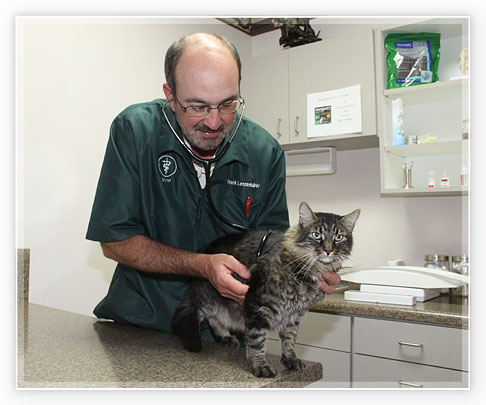 We are committed to the quality of your pet's life from puppyhood and kittenhood through their senior years. To make your visits convenient for you and for the optimum health of your pet, we've developed a series of health care programs that focus on the wellness of your pet through preventive veterinary care. Our exceptional health care teams are pleased to offer these services for your pet.
We are committed to the quality of your pet's life from puppyhood and kittenhood through their senior years. To make your visits convenient for you and for the optimum health of your pet, we've developed a series of health care programs that focus on the wellness of your pet through preventive veterinary care. Our exceptional health care teams are pleased to offer these services for your pet.
Wellness Care
The veterinarians and staff at the Wright City and Warrenton Veterinary Clinics believe that prevention is the key to your pet's long term health. This approach helps identify health issues before they become serious and minimizes the lifetime cost of care. We recommend thorough, routine wellness exams, vaccinations, regular laboratory work, deworming and fecal checks, as well as medications to prevent heartworm, fleas and ticks. (Most of the tests we offer at Warrenton and Wright City can be done during your dog or cat's regular exam.) Our doctors stay current with all the latest veterinary innovations to ensure your pet receives the best care possible.
A wellness exam is our chance to get to know your pet, to assess your pet's overall health, discuss any changes we see, update you on advancements in veterinary care, and for you to discuss any concerns or questions you may have.
During your pet's yearly wellness exam we will:
- Examine your pet's teeth, throat, and oral cavity
- Check your pet's vision and examine the eyes
- Examine the ears for infection, ear mites, allergic reaction and other related health issues
- Examine the respiratory system
- Assess your pet's heart
- Test your pet's reflexes
- Palpate lymph nodes and abdomen
- Inspect the skin
- Palpate joints and muscles for arthritis and other orthopedic conditions
- Test to evaluate the function of internal organs, blood, and other systems
Vaccinations
Your pet's vaccinations usually begin between 6-8 weeks of age, right about the time they begin to lose the natural immunity transferred from their mothers. For your pet's protection, our vaccinations are given in a series of visits every three to four weeks until your pet reaches 16 - 20 weeks of age. With each of these visits, your pet receives a comprehensive physical exam and deworming to protect your pet and your family's safety. Kittens receive a simple blood test to check for feline leukemia and FIV during their first visit.
Both feline leukemia and FIV (feline immunodeficiency virus) can be spread from cat to cat and it's important to remember that any cat that has been outdoors is especially at risk for these potentially fatal diseases.
We begin discussing your pet's wellness plan during your first visit. We are happy to make recommendations regarding heartworm preventive steps, flea and tick prevention, nutrition, oral health, behavior and reproduction.
Deworming and Fecal Check
Dangerous parasites are always present in the environment. Importantly, if brought into your home, these parasites can be passed from your pet to you and your family. Regular fecal checks and dewormings are the best way to prevent parasitic diseases and the transmission of intestinal parasites to your pet. It also prevents the shedding of parasite eggs, which contaminate yards or any place a pet defecates.
Regular Blood Testing
A complete physical includes a heartworm test, parasite screening, and should include a full blood workup. Not only can a full chemistry panel and complete blood count identify the presence of underlying disease processes, but these tests help create a baseline should your pet become ill between routine examinations. Additionally, blood work is necessary if we recommend a dental cleaning, removal of skin mass, or any other procedure that requires anesthesia.
We also recommend comprehensive blood work annually for all pets over the age of seven.
 Fleas and Ticks
Fleas and Ticks
Fleas and ticks are virtually everywhere. Although they're a bigger problem in certain parts of the country and at specific times during the year, no cat or dog is completely safe from them. Fortunately, many safe and highly effective products are available. Today, there's no reason for any pet or owner to be bothered by these pests.
Fleas are so common because they are reproductive marvels. A single female flea can lay as many as 30 eggs a day and can live and breed on your pet for up to 100 days. The eggs then fall and land in carpets and upholstery where they can lie dormant for up to eight months. The best management techniques of flea-proofing your home include regularly vacuuming of carpets, furniture, floors and areas where your pet sits or sleeps. You should also wash your pet's bedding, toys, and towels weekly.
Beyond causing serious discomfort and infesting your home, fleas and ticks carry diseases dangerous to both you and your pet. Fleas can transmit tapeworms to your pet, and often you can see segments of the tapeworm in your pet's stool. Your pet can also be allergic to fleas, and even just one flea bite can cause an intense allergic reaction, resulting in a severely painful skin infection.
In our region, ticks can carry a variety of serious illnesses, including Lyme Disease, Ehrlichiosis, and Anaplasmosis. These same ticks can bite people and transmit disease as well.
Contrary to what you may have read or been told, there are no holistic or natural products available which have been shown to be effective in preventing or killing fleas and ticks. Ask a veterinarian or staff member at either our Warrenton or Wright City Veterinary Clinic to recommend the flea and tick prevention product which is best suited for your pet.
Heartworm Disease
Heartworm disease is a serious, life-threatening disease that afflicts dogs and cats. Mosquitoes spread the disease by injecting the parasite into your pet at the time of the bite. After the infected female mosquito bites your pet, the heartworm migrates through the bloodstream and moves to the heart and adjacent blood vessels, maturing to adults within 6-7 months in dogs and 8 months in cats. As many as 30 species of mosquitoes can transmit heartworms.
Until the early 1970s, the occurrence of heartworm disease in the United States was primarily confined to the southeastern part of the country. Today, heartworm disease is found almost everywhere in the continental United States.
Clinical symptoms of heartworm disease develop very slowly. Often symptoms are not noticeable until several years after the initial infection. Lack of energy and exercise intolerance are early symptoms. Coughing and difficulty breathing are both common symptoms. As the disease progresses, most dogs develop congestive heart failure. Dogs often collapse in the final stage of the disease. In cats, the symptoms of heartworm disease are similar to those of feline asthma. Some cats may exhibit no signs of the disease, while others may suddenly die.
Since heartworm disease is increasing in frequency and is a serious and deadly disease, we recommend that your pet be tested annually. This test is highly accurate, and we often have the results in less than 10 minutes.
Heartworm disease prevention is simple. For dogs, a once-a-month heartworm preventative can be given as a tasty, chewable treat. This same chewable medicine prevents not only heartworms from developing, but also kills and prevents most other types of intestinal parasites that can infect your dog. Cats are protected by applying a drop of heartworm prevention liquid to the skin once-a-month. We recommend this to prevent heartworm disease as well as fleas, ear mites, and other types of intestinal parasites that can infect your cat.
If you would like to have your pet tested for heartworm disease, or if you would like additional information on how best to protect your pet and your family from these dangerous parasites, please call either Warrenton or Wright City Veterinary Clinic.
Adult Wellness
Adult canine and feline vaccinations are given from one year of age and older. Each year your pet receives a comprehensive physical exam and an intestinal parasite test to give us an annual baseline of your pet's health. During these visits we emphasize the importance of maintaining a healthy weight and good oral hygiene.
We also recommend that your canine receive an annual 4DX test - this is a simple blood test that checks your pet for four fairly common diseases: heartworm, and three tick-borne infections: Ehrlichiosis, Lyme disease and Anaplasmosus.